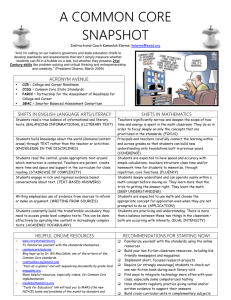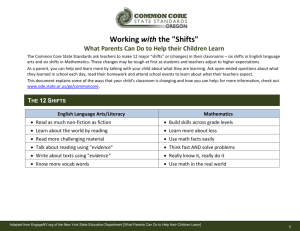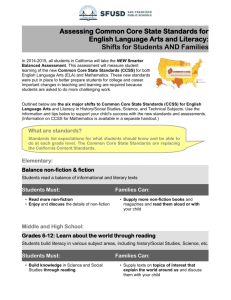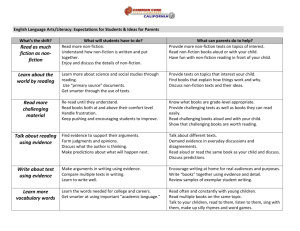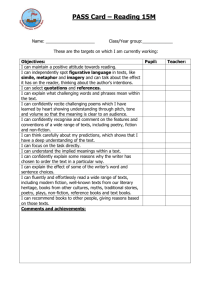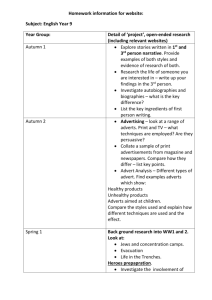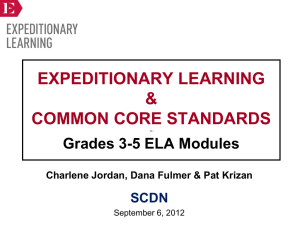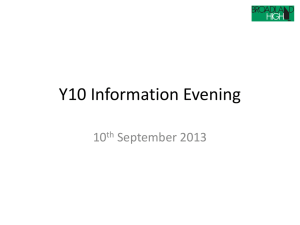What Parents Can Do to Help Their Children Learn
advertisement
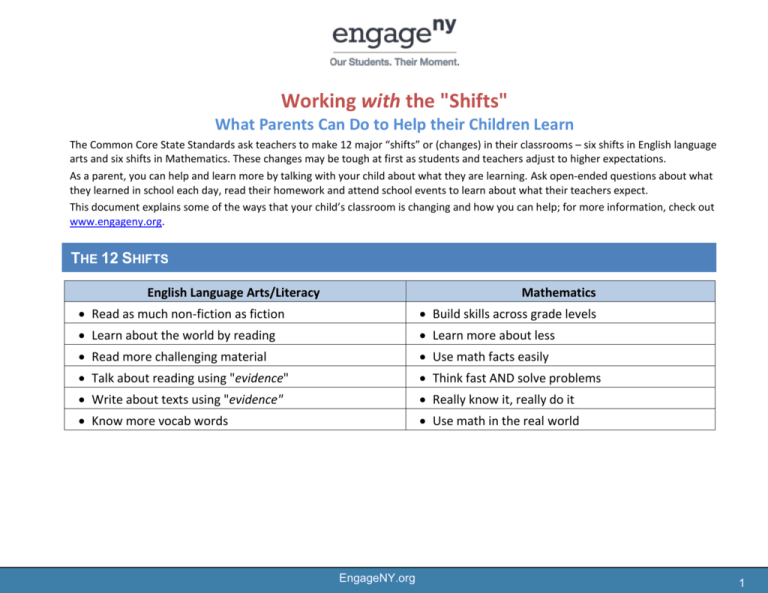
Working with the "Shifts" What Parents Can Do to Help their Children Learn The Common Core State Standards ask teachers to make 12 major “shifts” or (changes) in their classrooms – six shifts in English language arts and six shifts in Mathematics. These changes may be tough at first as students and teachers adjust to higher expectations. As a parent, you can help and learn more by talking with your child about what they are learning. Ask open-ended questions about what they learned in school each day, read their homework and attend school events to learn about what their teachers expect. This document explains some of the ways that your child’s classroom is changing and how you can help; for more information, check out www.engageny.org. THE 12 SHIFTS English Language Arts/Literacy Mathematics Read as much non-fiction as fiction Build skills across grade levels Learn about the world by reading Learn more about less Read more challenging material Use math facts easily Talk about reading using "evidence" Think fast AND solve problems Write about texts using "evidence" Really know it, really do it Know more vocab words Use math in the real world EngageNY.org 1 ENGLISH LANGUAGE ARTS/LITERACY: EXPECTATIONS FOR STUDENTS& IDEAS FOR PARENTS What’s the shift? Read as much fiction as nonfiction Learn about the world by reading Read more challenging material Talk about reading using evidence Write about text using evidence Know more vocab words What will students have to do? What can parents do to help? Read more non-fiction Supply more non-fiction texts Understand how non-fiction is written and put together Read non-fiction books aloud or with your child Enjoy and discuss the details of non-fiction Have fun with non-fiction in front of your child Learn more about science and social studies through reading Supply series of texts on topics that interest your child Use “primary source” documents Find books that explain how things work and why Get smarter through the use of texts Discuss non-fiction texts and their ideas Re-read until they understand Know what is grade-level appropriate Read books both at and above their comfort level Provide challenging texts as well as books they can read easily Handle frustration Read challenging books with your child Keep pushing to improve Show that challenging books are worth reading Find evidence to support their arguments Talk about texts Form judgments and opinions Demand evidence in everyday discussions and disagreements Discuss what the author is thinking Read aloud or read the same book as your child and discuss Make predictions about what will happen next Discuss predictions Make arguments in writing using evidence Encourage writing at home Compare multiple texts in writing Write “books” together using evidence and detail Learn to write well Review samples of exemplar student writing Learn the words they will need to use in college and career Read often and constantly with young children Get smarter at using the “language of power” Read multiple books on the same topic Talk to your children, read to them, listen to them, sing with them, make up silly rhymes and word games EngageNY.org 2 MATHEMATICS: EXPECTATIONS FOR STUDENTS & IDEAS FOR PARENTS What’s the shift? What will students have to do? What can parents do to help? Keep building on learning year after year Be aware of what your child struggled with last year and how that will effect ongoing learning Build skills across grade levels Advocate for your child Ensure that support is given for “gap” skills, such as negative numbers, fractions, etc. Learn more about less Spend more time on fewer concepts Know what the priority work is for your child at their grade level Use math facts easily Go more in-depth on each concept Spend time with your child on priority work Think fast AND solve problems Ask your child’s teacher for reports on your child’s progress on priority work Spend time practicing by doing lots of problems on the same idea Push children to know, understand and memorize basic math facts Know all of the fluencies your child should have Prioritize learning the fluencies your child finds most difficult Really know it, really do it Use math in the real world Make the math work, and understand why it does Ask questions and review homework to see whether your child understands why as well as what the answer is. Talk about why the math works Advocate for the time your child needs to learn key math skills Prove that they know why and how the math works Provide time for your child to work on math skills at home Apply math in real world situations Ask your child to do the math that comes up in daily life Know which math skills to use for which situation EngageNY.org 3
